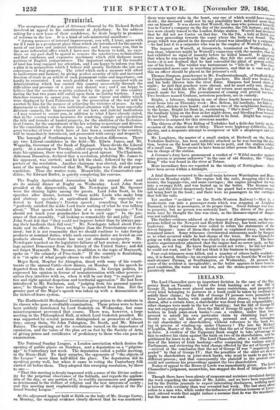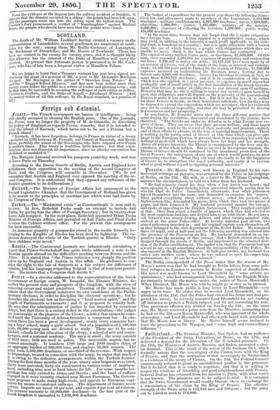IRELAND.
The Lord Chancellor gave an important decision in the case of the Tip- perary Bank on Tuesday. Under the Irish banking act of the 33d of Qeorge II, bankers were placed under many restrictions, and property of every kind belonging to partners in a bank could be taken by creditors to satisfy their claims; by the 6th of George IV persons were permitted to joint-stock oint-stock banks, with capital divided into shares- by transfer of shares, after a certain time, a shareholder was freed from all responsibiliqi other changes were made in the law of banking; but the 33d of George ii was not expressly repealed. Does the 33d of George II apply to the share- holders in Irish joint-stock banks ?—can a erWitor, under that law, particular to satisfy his owparticular claim by obtaining legal au- thority to seize all kinds of property, personal and real, belonging to any shareholder or shareholders, without reference to the bank be- ing in process of winding-up under Chancery ? The late Sir Michael O'Loghli.n, Master of the Rolls, decided that the act of George II was still in force. A creditor of the Tipperary Bank sought to take advantage of this to enforce his claim against the bank on two of its shareholders, and he petitioned for leave to do so. The Lord Chancellor, after a full considera- tion of the history of Irish banking—after comparing the various acts of Parliament, and reviewing the total change effected by the act of Geore IV —arrived at the conclusion that the set of George II was "negatively re- pealed" by that of George ; that the penalties of the older act do. not apply to shareholders in joint-stock banks, who must be made to Pay by a different process ; and that consequently the plaintiff in the present ease could not continue his proceedings against the two shareholders. Notice of appeal to the House of Lords was immediately given. The Lord Chancellor's judgment, meanwhile, has stopped the flood of litigation for a time. Though there have been plenty of rumours and surmises circulated daring the week regarding. the min-der of Mr. Little, anti we have been repeatadlY led by the Dublin journals to expect interesting disclosures, nothing more is known with certainty than was revealed last week. The last story afloat refers to a man who, while under the influence of delirium tremens at Liver pool, uttered words that might induce a surmise that he was the murderer: but the man was mad. From the evidence at the inquest into the railway accident at Dunkitt, it „yearn that the disaster occurred in a siding : the points had been left o n, al,d the passenger-train ran into the siding upon the ballast-train. The Coroner's Jury pronounced a verdict of "Manslaughter" against Michael Brien, the ganger who should have seen that the points were closed.



























 Previous page
Previous page